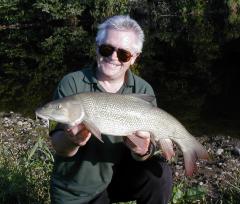Anglers wear polarised glasses for several reasons, not the least being the ability they give you to see though the surface of a water and spot fish. Other reasons are to cut out bright light from surface and sky and thus prevent headaches and, not least, to protect the eyes, particularly from flying objects.Other than the polarising ability any cheap pair of sunglasses that adequately cover the eyes will do the trick. And you can get a cheap pair of polarised (and I use the term loosely) glasses from any street market for less than a tenner. If you want something a little better you can buy ‘proper’ polarised glasses for about £ 16.00 to £ 20.00. But beware, none of them are the real thing!


Now, I’m a spectacle wearer, so for me to get the benefit of polarising lenses I have two choices. To wear a polarised clip-on over my glasses, or to buy a pair of prescription polarised glasses. Clip-ons are awful, they scratch the lenses of my glasses through constantly fitting them and removing them, and they just make my glasses feel uncomfortable. Worse still, the thin ‘lens’ of the clip-on can only be a coated version, therefore I am not getting the benefit of a true polarised lens. The alternative is to buy a pair of prescription polarised glasses which normally cost an arm and a leg from your High Street opticians.
So when I heard about Optilabs, who offer true polarised glasses, prescription and non-prescription, and a pair especially designed for the angler, I couldn’t wait to get more details. So I rang the man in charge, Tony Kerr, and he couldn’t have been more helpful. He told me what was available and explained the pricing structure. He said I could pick a frame by going to Optilabs’ web site (www.optilabs.com) and choosing from those pictured.
I opted for a simple black, plastic type frame rather than the Loubsol frame that is specifically designed for anglers, mainly because I wanted a pair of polarised glasses that were suitable for all occasions and not just fishing. Let it be said, though, that if you are buying polarised glasses specifically for fishing then the Loubsol is by far the best buy. The removable side frames shield the eyes from side lighting, and you have the best possible protection from flying objects and being poked in the eye by branches, etc. They are ultra-light, tough polyamide and have shock resistant hinges. The inner brow has an integral compact foam rubber strip covered with 100% cotton jersey which is absorbent, anallergic and hypo-allergenic. Optilabs describe them as the ultimate in fishing glasses, and really, there is no arguing with that.
The procedure is for the client to phone for an order form, which will be sent to you by return post along with set of pictures of the available frames. You then return the order form, your prescription and frame choice, Optilabs then make up the glasses and they, along with your prescription, are back with you in two to three days. Simple. However, if you have something a little more special than single vision lenses, or plain bifocals, then it becomes just slightly more complicated. I wear varifocal lenses which, for those who don’t know, are bifocals where, to put it as simple as possible, the distance and close part of the lens is graduated from one to the other so that you don’t have that obvious jump. They suit some people and not others. If you opt for varifocal then Optilabs send your frames with plain lenses which you have to take to your High Street optician for ‘marking up’. Which is exactly what I did with no problems whatsoever. I then returned the marked glasses to Optilabs and I was wearing the finished glasses three days later.
The difference is incredible. I realise now that I’ve never had a pair of real polarised glasses before, and if I’d known what a difference there is between the clip-on compromise and the real thing I would have done something about it a long time ago. These are excellent glasses and come with a very attractive price tag compared to High Street shops.
There is a choice of lens type, but for fish-spotting it is the amber high contrast ones you need. I also have a pair of the yellow high contrast type, which make everything brighter in dull conditions. You have wear a pair to believe the difference they make. All Optilabs polarised lenses provide full UV protection and have a durable water repellent coating. Plain, non-prescription glasses cost £ 56.95 with prescription ones costing another £ 20. Bifocals are yet another £ 20, and varifocals an extra £ 30.00. Post and packing is an additional £ 2.50. Lenses fitted to your own frames reduces the price by £ 20.00. Loubsols are special and therefore cost more. They are £ 89.95 for plain lenses with the corresponding increase for prescription, bifocal and varifocal options.













